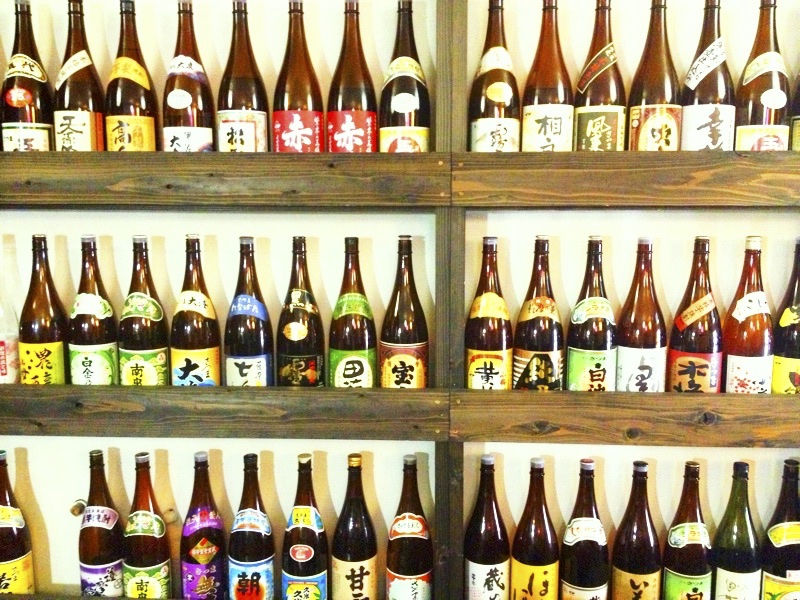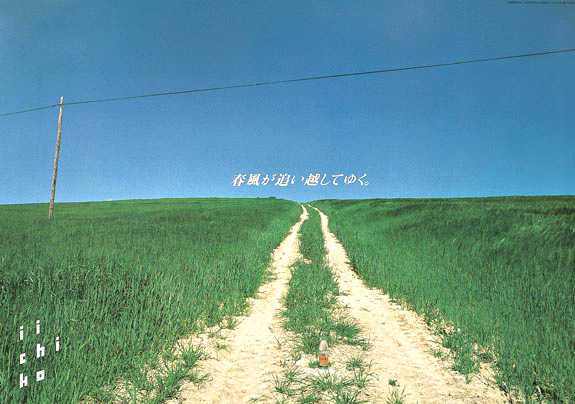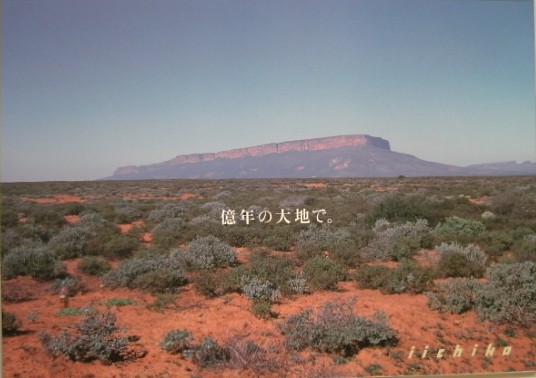A previous post on last year’s disappointing shōchū sales piqued my interest anew in Iichiko, Japan’s largest shōchū distillery in terms of revenue and producer of the best-selling Iichiko mugi (barley) jōchū. As I mentioned before, I had never tried their mugi jōchū, but was familiar with the Ichiko brand as the company has for many, many years run an advertising campaign with large posters featuring a bottle of their shōchū, sometimes hidden like Waldo, in a variety of outdoor settings.
I’m not sure what the message of the ads is supposed to be, but I’ll admit they do make an impression. That said, I have never once looked at the poster and thought, “I wouldn’t mind give that stuff a try.”
The article in the Keizai Shimbun (see below), however, changed all that. "Best-selling mugi jōchū? Surely, a million-plus consumers can't be wrong."
Well, last week when I was barhopping (梯子酒, hashigo zaké) with some friends I got sozzled enough to finally give Iichiko a try. I'd drunk just about everything else on the menu, what the Japanese call champon-ing (ちゃんぽん, champon), and figured a glass of mugi jōchū wouldn't kill me.
Boy, I wish I hadn’t.
Iichiko’s catch phrase, “The Napoleon (as in the brandy) of the Working Class Neighborhood” (下町のナポレオン Shitamachi no Naporeon), should have been fair warning.
My first sip of the shōchū evoked an unusual reaction from me—the very same one I often witness in others when they have just tried the firewater I happened to be drinking: “Wah!”
Mugi jōchū is supposed to be one of the more drinkable varieties of shōchū, but this Iichiko had the zingy palate of paint thinner. Surely, a million-plus consumers didn’t know shit from Shinola.
いいちこ
Iichiko Mugi Jōchū
Kampai?
いいちこむぎ焼酎 (Iichiko Mugi Jōchū)
25% Alc/Vol
Rate: ★
This is the original article I quoted from. When new data is released later this month, I will report it here.
Teikoku Databank released the results of their annual survey of the shōchū market August 12th, reporting that the top fifty shōchū and awamori makers had gross sales of ¥298.1 billion in 2010, a drop of 2.5% over the previous year. This is the second consecutive yearly decline--sales fell 1.1% in 2009. Reasons for the drop include a slump in consumer demand and the recent popularity of highballs. (I am guilty of this. I never enjoyed drinking whiskey until Suntory released it Kaku Haibōru which I drink like soda now. Hic!)
The gross sales of the top fifty shōchū and awamori producers was studied from January to December of 2010. Forty-six of the companies are based in the Kyūshū-Okinawa region.
Of the fifty companies, roughly sixty percent, or 29 companies, showed a drop in sales. The firm with the greatest sales, mugi jōchū maker, Iichiko, based in Usa City, Ōita Prefecture, saw a decrease of 4.9% in sales. (I have long been familiar with Iichiko from their ad campaign--every month they pin up large posters at train stations like the one at the top of this post--but I have never once tried their mugi jōchū. High time I did.) Four of the top five companies all experienced a reduction in revenue. Only second placed Kirishima Shuzō of Miyakonojô City in Miyazaki Prefecture enjoyed a 10.4% increase in sales. (Kuro Kiri, as everyone calls it, is okay. Not the best shōchū in the world, but not the worst either.)
A leading force in the imo (potato) jōchū market with Kirishima Black (黒霧島) at the center, its sales have continued to grow. The company has placed second in gross sales for eight years running. The Kirishima Black brand is well known in metropolitan areas and has maintained steady growth.
Among awamori makers, Kumejima’s Kumesen has enjoyed a 7.4% increase in sales, coming in 19th, up four places from 2009. On the other hand, Higa Shuzō of Yomitan City, Okinawa Prefecture, which produces Zampa brand awamori, has seen their sales slip 13.6%. (Kumesen is much better than Zampa--full stop. It's no mystery that one distillery's sales have gone up while the other's has suffered.)
As consumers continue to turn to cheaper products (more on this in a later post), competition among shōchū producers has intensified. With the popularity of the comparatively inexpensive highball, Suntory Holdings has seen sales of whiskey increase 17%. It can be said that some of the demand for shōchū has been “drunken” by thirst for highballs. (This pun works better in the Japanese.)
From the Nikkei Shimbun





